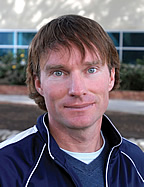Surf's Up
Professor studies the psychology of big-wave surfing
February 4, 2008
by Mimi Ko Cruz
Ripping violent 35-foot waves that can drown even the most fearless big-wave surfer is not for the average daredevil. And, Lenny Wiersma, associate professor of kinesiology, wants to know just what goes through the minds of big-wave surfers, or extreme athletes, as they ride those giant ocean walls.
Wiersma’s subjects include some of the most well-known surfers who tackle the current at Maverick’s, the notorious shark-infested Northern California surfing spot where waves have reached 100 feet.
One subject said that nine years of training as a Navy SEAL did not prepare him for surfing at Maverick’s, said Wiersma, who joined Cal State Fullerton’s faculty in 2001 after earning his doctorate of physical education from Springfield College.
“It’s violent and terrifying,” he said. “I want to know why these guys do it, and I’m asking them one question: ‘Tell me about your experiences big-wave surfing.’”
During a recent conversation, Wiersma answered the following questions about his current research and his personal life:
Why are you studying big-wave surfers?
“Traditionally, big-wave surfers are loosely defined as those who surf waves in excess of 20 feet. I believe, and am finding, that these individuals have a level of courage far exceeding the ‘average’ person, seek challenges on a regular basis and can provide a perspective of sport psychology that may differ from participants in traditional sports. Basically, these guys (they are almost all male) surf mountains that move, do it in very cold, shark-infested water, and are very humble about it.”
What else are you learning?
“I have a lot of respect for these surfers because they’re going out there and surfing these treacherous waves, knowing they can get hurt, but they have the courage to do it even though it’s scary as hell. Outside observers claim they are crazy to risk their lives in a reckless fashion, but I’m not so sure this is the case. They are amply skilled and prepared and don’t appear to have a death wish. Some are highly educated, including at least two medical doctors, and most are just living their lives at full volume.”
What do you plan to do with this research?
“My main goal is to publish it in a scientific journal. I think it could bring a different perspective.”
Do you surf?
“Not like these guys. I’ve been involved in aquatic activities my whole life, currently as a competitive swimmer. This project has motivated me to spend much more time in and near the ocean.”
What got you interested in kinesiology and sport psychology?
“I love to play, to be active and to motivate others to do the same. Movement is such an important aspect of my life, and I believe it can enhance the lives of almost anybody. Sport psychology has been my area of study, and this project takes a very different approach to the psychology of a potentially dangerous activity.”
What are your future plans/goals?
“I’ll go up for full professor, hopefully, in a couple years, so that is a goal of mine. I hope to evolve this line of surfing research, perhaps writing about it beyond the academic audience. In general, I like to develop new interests and skills professionally and personally, such as my most recent passion: photography. You can check out some of my photos, for example, at www.flickr.com/photos/lwiersma.”


